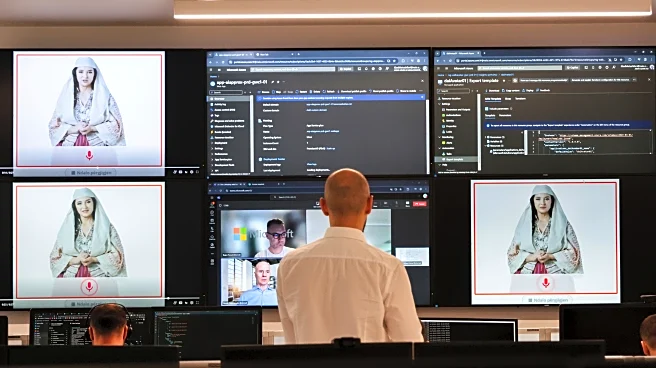What's Happening?
Netflix has reported its quarterly earnings, revealing a revenue of $11.51 billion, slightly below Bloomberg's forecast of $11.52 billion, and earnings per share of $5.87, which fell short of the estimated
$6.94. Consequently, Netflix's stock price decreased by 5.6%. Despite the financial results, Netflix co-CEOs Ted Sarandos and Greg Peters emphasized the company's focus on generative AI implementation during their shareholder letter and earnings call. They highlighted AI's role in enhancing content generation, user experience, and advertising. Netflix has been integrating machine learning and AI into its operations for years, including title recommendations and production technology. The company is now testing AI features like conversational search and localization of promotional assets, aiming to empower creators with generative AI tools.
Why It's Important?
The integration of generative AI by Netflix signifies a strategic shift towards leveraging advanced technology to enhance its offerings and maintain competitiveness in the streaming industry. This move could potentially improve user engagement and streamline content creation processes, offering creators new tools to realize their visions. As AI becomes more prevalent in media production, it may lead to more personalized viewing experiences and broaden the accessibility of content across different languages and regions. However, the financial underperformance and stock drop highlight the challenges Netflix faces in balancing technological innovation with investor expectations. The company's focus on AI could be a pivotal factor in its future growth and ability to attract and retain subscribers.
What's Next?
Netflix's ongoing beta tests and AI implementations suggest a continued focus on integrating AI into various aspects of its operations. The company may further develop AI-driven features to enhance user experience and content discovery. As Netflix explores AI's potential, it could face scrutiny regarding the ethical implications of AI in content creation and its impact on traditional storytelling. Stakeholders, including creators and investors, will likely monitor how these technological advancements affect Netflix's market position and financial performance. The company's ability to successfully integrate AI while addressing potential concerns will be crucial in shaping its future trajectory.
Beyond the Headlines
Netflix's embrace of AI tools raises questions about the future of content creation and the role of technology in storytelling. The use of AI for tasks like de-aging and concept art could redefine creative processes, potentially leading to new forms of artistic expression. However, this shift also poses challenges related to intellectual property rights and the authenticity of AI-generated content. As AI becomes more integrated into media production, it may influence cultural perceptions of creativity and originality, prompting discussions about the balance between technological innovation and artistic integrity.









